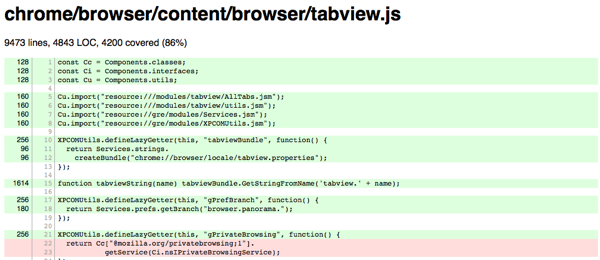Checking mochitest test coverage
 One of the last bugs for Firefox Panorama was bug 625818: “Check Panorama mochitest test suite coverage”. Our automated tests ensure that we do not regress on existing functionality, but it’s only as good as its coverage: how much of the Panorama code base is actually being “hit” through the process of running the test suite.
One of the last bugs for Firefox Panorama was bug 625818: “Check Panorama mochitest test suite coverage”. Our automated tests ensure that we do not regress on existing functionality, but it’s only as good as its coverage: how much of the Panorama code base is actually being “hit” through the process of running the test suite.
Panorama went through a pretty rapid development cycle, making it into Firefox 4 which was released today (yay!). Moreover, for a while we were developing outside of mozilla-central, without the regular “patches require tests” requirement. This makes checking its test coverage particularly important.
Check out the final result, the Panorama test coverage report. The good news: our code coverage is 86%! (Some notes on what improvements can be made are in the bug.)
PhiliKON had previously worked on hooking into the JS Debugger service’s interruptHook to test xpcshell tests. I modified this code to run instead in the Mochitest browser chrome tests. This code can be found on the bug.
With this patch applied, I invoked the test suite with the following code: TEST_PATH=browser/base/content/tests/tabview COVERAGE_FILTER="*tabview*" COVERAGE=true make -C obj-ff-dbg mochitest-browser-chrome . That’s a regular mochitest-browser-chrome invocation with the COVERAGE=true flag which turns on code coverage checking, and COVERAGE_FILTER=*tabview* which filters out results from files which don’t have “tabview” in their paths. This creates a file called coverage.json in the working directory of the test suite, meaning, for me, obj-ff-dbg/_tests/testing/mochitest/.
This JSON file is a multidimensional array, with file paths and then line numbers as keys. The file paths here, as best as possible, have been converted into local filesystem paths. PhiliKON built a script which produces beautiful reports based on this output.
A word of warning: running with this JSD interruptHook is ridiculously slow. A number of tests for Panorama are timing-dependent (drag-drop tests, for example), making some of them fail, but that’s okay… as long as it completed not via a timeout, it actually did run through all the code. In order to get this to run through everything with some degree of control, I split up the mochitest tabview suite in to a few chunks. I then took the multiple resulting coverage.json files and passed them into another script, in tools/coverage/aggregate.py, which takes multiple JSON results like this and puts them together into a single JSON file. I then passed this aggregate JSON file to PhiliKON’s wonderful report script and—voila—the Panorama test coverage report! Easy as pie.


